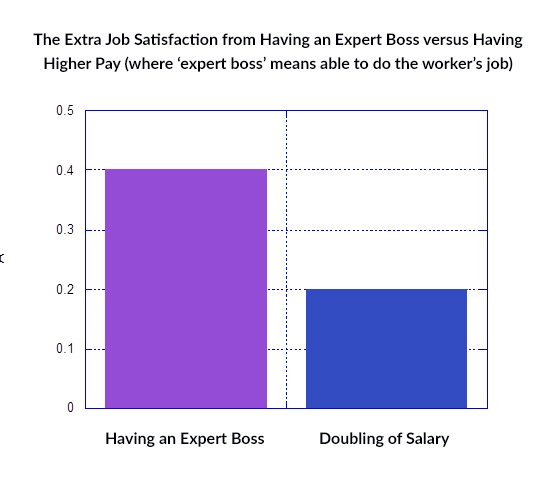The Boss is the Biggest Influence on Employee Job Satisfaction
This article is based on joint work with Ben Artz at the University of Wisconsin and Amanda Goodall at Cass Business School in London. A version of this article has also appeared in the digital edition of Harvard Business Review.
Bosses are everywhere; you probably have one; and you may well be one yourself. So does the boss matter a lot or only a little? How much do bosses affect the happiness and job satisfaction of workers? We have recently finished a project that tries to understand exactly that. The answer is: enormously. Bosses matter far more for job satisfaction than any other factor -including influences like the level of employee remuneration and the nature of the job.
Expert leadership matters
In our research we focused especially on how workers are affected by the technical competence of the boss (that is, by how much the boss is a real expert in what is being done in the organization). Boss competence is, admittedly, a subtle concept. Hence we measure it in a number of different ways. The bottom line of the study is that employees are far happier when they are led by people with deep expertise in the core activity of the business. In particular, what seem to matter are:
- whether the supervisor worked their way up inside the company
- whether the supervisor could in an emergency do the employee’s job
- the supervisor’s assessed level of competence.
All three of these are predictive of substantially greater levels of happiness among employees.
The first two in the list seem especially novel, and have not been studied before by economists. We take both these to be markers of an ‘expert leader’. Research into the topic of expert leadership is recent but burgeoning. Modern evidence demonstrates, for example, that hospitals do better if led by doctors rather than by general managers, that Formula One racing teams do better if led by successful former racing drivers, that US basketball teams do better when led by former All Star basketball player, and that universities do better when led by top researchers rather than talented administrators. Those with deep knowledge of the underlying business, in other words, tend in the long run to turn into the best bosses.
Companies can learn from this. Although the job satisfaction and happiness of workers might be believed to be important as objectives in themselves, it is now known that these also matter indirectly for performance. There is growing evidence, from randomized trials done under laboratory conditions, that when you make workers happier they become more productive. One study found that quite small boosts in happiness went on to produce a reliable 15% extra in labor productivity. Moreover, employees who are happy at work are less prone to quit, and it is well known that a high level of quits is expensive for a company. Lastly, it has recently been demonstrated that firms with happy employees go on to have better stock-price growth in the future. So shareholders also benefit if the employees are happy.
The effects of bosses
In our project, we studied thousands of randomly selected employees and workplaces. The samples are from both the USA and Britain. We use traditional ways of measuring the job satisfaction of employees, like the survey question in the USA: “ How do you feel about the job you have now?” 1 = “dislike very much”, 2 = “dislike somewhat”, 3 = “like fairly well”, 4 = “like very much”. People’s answer on average is 3.2. In Britain: “Please answer on a 7-point scale from “I am completely satisfied with my job,….I am completely dissatisfied with my job.” We find the answer there is, on average, approximately 5.3. Overall, these answers seem to us to be good, but perhaps not great, news. Workers are fairly happy.
When we look closely at the data, a striking pattern emerges. The benefit of having a highly competent boss is easily the largest positive influence on a typical worker’s level of job satisfaction. Even we were surprised by the size of the measured effect.
To illustrate the remarkable importance of bosses, we find that, among American workers, the gain in job satisfaction from having a highly competent boss is twice as large as that from having a college degree, and twice as large as from having a really big salary. In other words, once you are an employee inside a workplace, the abilities of the boss matter far more than your education or your take-home pay. Our evidence provides statistical support for that old saying that people do not leave bad jobs but instead leave bad bosses.
In our analysis we study how employee job satisfaction is shaped by other kinds of features of people and workplaces. Many factors matter for happiness at work -- as would be expected. Nevertheless, the bottom line is that they all loom far smaller than the long shadow cast in the office by the boss. We conclude that, as shown in Graphic 1, the competence of the boss is many times as influential as things like the type of occupation or industry. In Graphic 2, boss expertise is far more important than a doubling of salary.
Technically competent bosses are crucial. We find that your job satisfaction is profoundly moulded by your boss’s competence; and your own team’s job satisfaction levels depend on your competence.
How might this research help organizations when they come to choose whom to hire into senior positions?
Our work shows that it is muddle-headed to obsess about charisma. Instead, we offer evidence that unless you hire a real expert -- an expert in the business you are in and not someone glamorous from another industry -- then you are taking a risk with your organization’s profitability and future prospects. Employees are happiest when the boss really understands the core business. His or her haircut, or the designer label on the suit, is not what matters. Technical competence is.
Graphic 1
IN TERMS OF IMPROVING YOUR JOB SATISFACTION AT WORK: USA Results
The benefit of having a highly competent boss is:
Twice as big as the benefit of having a college degree
Twice as big as the benefit of having a high salary
8 times as big as the benefit of working in the public sector
5 times as big as the benefit of having long tenure with the employer
3 times as big as the benefit of working in a good industry
4 times as big as the benefit of working in a desirable occupation
SOURCE: FIGURE 1 IN THE TECHNICAL ILRR PAPER*.

Graphic 2
IN TERMS OF IMPROVING YOUR JOB SATISFACTION AT WORK: British Results
The benefit of a boss that could do the worker’s job very well rather than not at all
Vs
The benefit of a doubling of pay
Is
0.4 extra job satisfaction points
Vs
0.2 extra job satisfaction points.
SOURCE: TABLE 3 IN THE ILRR PAPER. SATISFACTION SCALE RUNS FROM 1 TO 4.

The Survey Question was “How true is it that your supervisor could do your job if you were away?” 1 = “not at all true”, 2 = “somewhat true”, 3 = “true”, 4 = “very true”.
*ILRR - Boss Competence and Worker Well-being (with B. Artz and A. Goodall). Industrial & Labor Relations Review, 70, 419-450.

About Professor Andrew Oswald
Professor Andrew Oswald is Professor of Economics and Behavioural Science at the University of Warwick.
Andrew Oswald's work lies mainly at the border between economics and behavioural science, and includes the empirical study of human happiness. He is an ISI Highly-Cited Researcher and is credited with helping to create the field now known as the economics of happiness, which is one of the fastest growing within social science.
